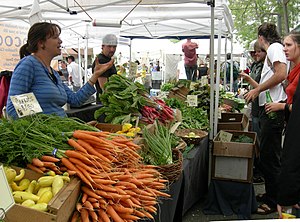Ekonomi

Ekonomi merupakan salah satu ilmu sosial yang mempelajari aktivitas manusia yang berhubungan dengan produksi, distribusi, dan konsumsi terhadap barang dan jasa. Istilah "ekonomi" sendiri berasal dari bahasa Yunani, yaitu οἶκος (oikos) yang berarti "keluarga, rumah tangga" dan νόμος (nomos) yang berarti "peraturan, aturan, hukum". Secara garis besar, ekonomi diartikan sebagai "aturan rumah tangga" atau "manajemen rumah tangga." Sementara yang dimaksud dengan ahli ekonomi atau ekonom adalah orang menggunakan konsep ekonomi dan data dalam bekerja.
Manusia sebagai makhluk sosial dan ekonomi
Manusia sebagai makhluk sosial dan makhluk ekonomi pada dasarnya selalu menghadapi masalah ekonomi. Inti dari masalah ekonomi yang dihadapi manusia adalah kenyataan bahwa kebutuhan manusia jumlahnya tidak terbatas, sedangkan alat pemuas kebutuhan manusia jumlahnya terbatas. Beberapa faktor yang memengaruhi sehingga jumlah kebutuhan seseorang berbeda dengan jumlah kebutuhan orang lain:
- Faktor ekonomi
- Faktor lingkungan sosial budaya
- Faktor fisik
- Faktor pendidikan
- Faktor moral
Inflation and monetary policy
Main articles: Inflation and Monetary policy
See also: Money, Quantity theory of money, Monetary policy and History of money
Money is a means of final payment for goods in most price system economies and the unit of account
in which prices are typically stated. A very apt statement by Professor Walker, a well-known economist is that, " Money is what money does"[citation needed]. Money has a general acceptability, a relative consistency in value,
divisibility, durability, portability, elastic in supply and survives with mass public confidence. It includes currency held by the nonbank public and checkable deposits. It has been described as a social convention, like language, useful to one largely because it is useful to
others.
As a medium of exchange, money facilitates trade. It is essentially a measure of value and more importantly, a store of value being a basis for credit creation. Its economic function can be contrasted with barter (non-monetary exchange). Given a diverse array of produced goods and specialized producers, barter may entail a hard-to-locate double coincidence of wants as to what is exchanged, say apples and a book. Money can reduce the transaction cost of exchange because of its ready acceptability. Then it is less costly for the seller to accept money in exchange, rather than what the buyer produces.[81]
At the level of an economy, theory and evidence are consistent with a positive relationship running from the total money supply to the nominal value of total output and to the general price level. For this reason, management of the money supply is a key aspect of monetary policy.[82]
Fiscal policy
Main articles: Fiscal policy and Government spending
Governments implement fiscal policy by adjusting spending and taxation policies to alter aggregate demand. When aggregate demand falls below the potential output of the economy, there is an output gap where some productive capacity is left unemployed. Governments increase spending and cut taxes to boost aggregate demand. Resources that have been idled can be used by the government.
For example, unemployed home builders can be hired to expand highways. Tax cuts allow consumers to increase their spending, which boosts aggregate demand. Both tax cuts and spending have multiplier effects where the initial increase in demand from the policy percolates through the economy and generates additional economic activity.
The effects of fiscal policy can be limited by crowding out. When there is no output gap, the economy is producing at full capacity and there are no excess productive resources. If the government increases spending in this situation, the government use resources that otherwise would have been used by the private sector, so there is no increase in overall output. Some economists think that crowding out is always an issue while others do not think it is a major issue when output is depressed.
Skeptics of fiscal policy also make the argument of Ricardian equivalence. They argue that an increase in debt will have to be paid for with future tax increases, which will cause people to reduce their consumption and save money to pay for the future tax increase. Under Ricardian equivalence, any boost in demand from fiscal policy will be offset by the increased savings rate intended to pay for future higher taxes.
Tindakan, Motif dan Prinsip Ekonomi
Tindakan Ekonomi
Tindakan ekonomi adalah setiap usaha manusia yang dilandasi oleh pilihan yang paling baik dan paling menguntungkan. misalnya: Ibu memasak dengan kayu bakar karena harga minyak tanah sangat mahal. Tindakan ekonomi terdiri atas dua aspek, yaitu :
- Tindakan ekonomi Rasional, setiap usaha manusia yang dilandasi oleh pilihan yang paling menguntungkan dan kenyataannya demikian.
- Tindakan ekonomi Irrasional, setiap usaha manusia yang dilandasi oleh pilihan yang paling menguntungkan namun kenyataannya tidak demikian.
Motif Ekonomi
Motif ekonomi adalah alasan ataupun tujuan seseorang sehingga seseorang itu melakukan tindakan ekonomi. Motif ekonomi terbagi dalam dua aspek:
- Motif Intrinsik, disebut sebagai suatu keinginan untuk melakukan tidakan ekonomi atas kemauan sendiri.
- Motif ekstrinsik, disebut sebagai suatu keinginan untuk melakukan tidakan ekonomi atas dorongan orang lain.
Pada prakteknya terdapat beberapa macam motif ekonomi:
- Motif memenuhi kebutuhan
- Motif memperoleh keuntungan
- Motif memperoleh penghargaan
- Motif memperoleh kekuasaan
- Motif sosial / menolong sesama
Prinsip Ekonomi
| Bagian dari seri |
| Ilmu Pengetahuan |
|---|
 |
Prinsip ekonomi merupakan pedoman untuk melakukan tindakan ekonomi yang didalamnya terkandung asas dengan pengorbanan tertentu diperoleh hasil yang maksimal. Prinsip ekonomi adalah dengan pengorbanan sekecil-kecilnya untuk memperoleh hasil tertentu, atau dengan pengorbanan tertentu untuk memperoleh hasil semaksimal mungkin.

